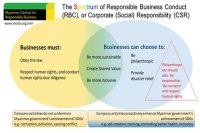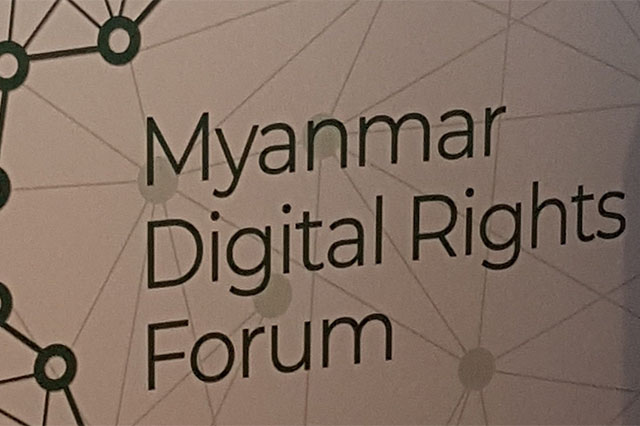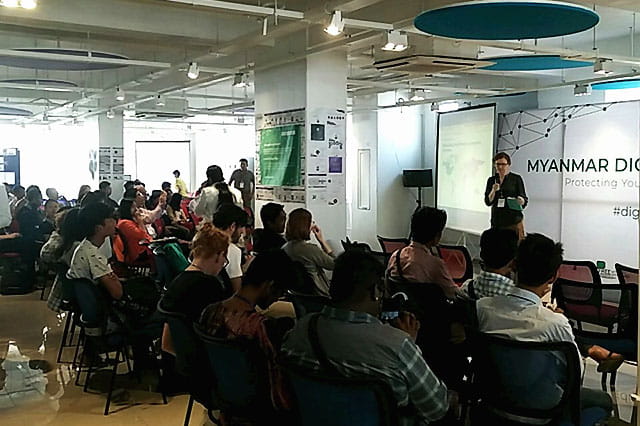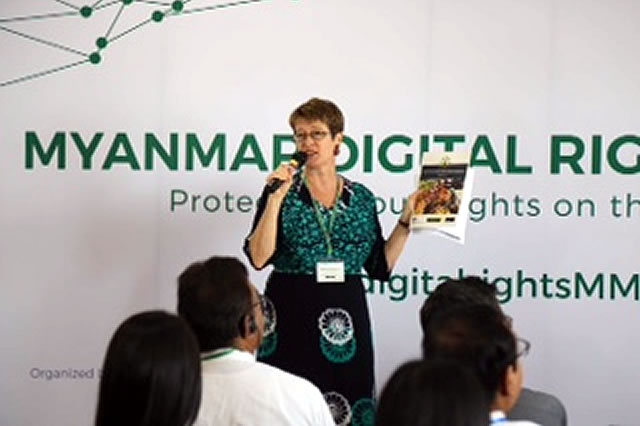Fourth Myanmar Digital Rights Forum 2020 urges end to Internet Shutdown in Rakhine and Chin States, calls on next government to abolish 66(d)
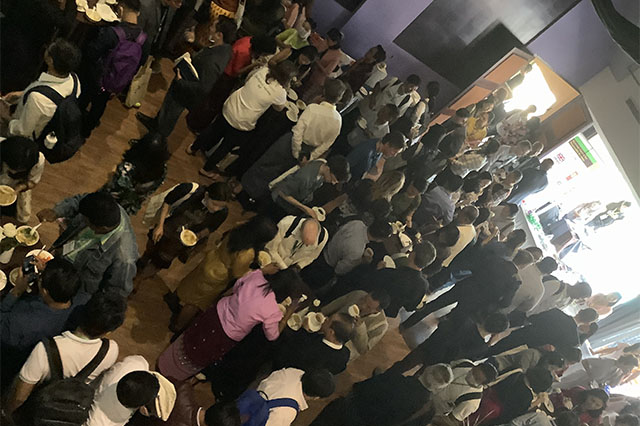
The Fourth Myanmar Digital Rights Forum took place on 28/29 February 2020 at Rose Garden Hotel, Yangon attended by over 350 participants, including senior government officials, MPs, civil society organisations, media, businesses and international human rights and digital rights experts and academics.
The Forum was opened with Keynotes by U Soe Thein, Permanent Secretary of the Ministry of Transport and Communication who updated on current developments in policy, legislation and implementation highlighting the need for increased rural access to the internet, and that the Universal Services Strategy and Fund would support this and measures to increase digital literacy; Staffan Herrstrom Swedish Ambassador and main sponsor of the Forum who highlighted concerns about internet shutdown. Dr. Axel Harneit-Sievers, Director of the Heinrich Böll Stiftung Myanmar, another Forum sponsor and Jes Kaliebe Petersen, CEO of Phandeeyar (speaking on behalf of the four MDRF organisers Phandeeyar, MCRB, Freedom of Expression Myanmar (FEM), Myanmar ICT for Development Organisation (MIDO)) both highlighted digital rights, risks and responsibilities in election year and the importance of digital literacy.
U Thaung Tin, Founder and Chairman of KMD, a leading local computer company, and member of the CEC of the Union of Myanmar Federation of Chambers of Commerce and Industry, and its Innovation Working Group, outlined how Myanmar’s ICT business community seeks to operate responsibly. He explained relevant activities of the business associations the Myanmar Computer Federation and the Myanmar Digital Economy Association. MDEA was established in 2019 to address e-commerce, consumer rights and support local SMEs.
He said that he would encourage members of the Association to be guided by the six high-level general principles of the OECD/G20 for protecting digital consumers when considering how to respect human rights. These are:
-
Fair business and advertising practices
-
Appropriate disclosures
-
Effective processes for transaction confirmation and payment
-
Measures to address privacy and security risks
-
Product safety across e-commerce supply chains
-
Meaningful access to effective mechanisms to resolve disputes
Daw Ei Myat Noe Khin of Myanmar Tech Accountability Network, and one of the initiators of the first MDRF, who spoke of key concerns of activists in the election year and called for the lifting of the world’s longest Internet shutdown in the affected townships in Rakhine and Chin state, the withdrawal of cases against those who protested against the shutdown and refraining from imposing an Internet shutdown in the future.
Initial keynotes were followed by a presentation by Sumana Rajarethnam of the Economist/Intelligence Unit on their Inclusive Internet Index which looks at Availability, Affordability, Relevance and Readiness. In the 2020 Index, launched shortly after the MDRF, Myanmar rates 67th out of 100 , higher than Bangladesh, Cambodia and Laos. Sweden, the MDRF sponsor, comes out top.
Following a presentation from Svetlana Zens of MCRB on developments in the previous year, participants were polled on their views on a variety of topics relating to Freedom Online and Digital Rights, including whether online freedom of expression, privacy, and access to the internet had improved or deteriorated over the previous year. The results showed that, on a scale of 1-9, where 1 is a major deterioration, 9 a big improvement and 5 is the same, both freedom of expression and privacy considered to have deteriorated (rated 3.1 and 3.3 respectively) while access to the internet was rated 5 – i.e. on average unchanged. Some participants recognised improvements in availability, for example for those in urban areas, women and persons with disabilities, as well as through the launch of the Universal Service Fund to subsidise connections in remote regions,. However, others recalled the world’s longest Internet Shutdown in the nine townships of Rakhine State, including Chin State. A minute of silence was held to recognise people living under the ongoing blackout in those two states since June 2019, and conference participants called for the blackout to be lifted.
When individual elements of declining Freedom of Expression were polled, top of the list of concerns was issues were misuses of defamation laws like 66(d) (27%), followed by the risk online disinformation in the 2020 elections (22%) and the Internet shutdown (19%). Privacy and cybersecurity concerns were identified as government tracking my activity online (31%), unauthorised use of personal data (25%) and identity and financial theft and fraud (20%). Also, 22% of respondents told us that they or a family member had been cyber-bullied or stalked. Other topics polled included use of Zawgyi and UNICODE fonts (2019 was the year in which the Myanmar government pushed for users to transition to UNICODE based fonts for better accessibility and searchability). Half of users said they were using a Unicode font, while 38% said they used both Zawgyi and Unicode. Asked which were the best government websites, DICA and the President’s website received most positive feedback.
When asked what the digital rights priorities of the government and parliament to be elected in November 2020 should be, top of the priorities was abolition of Article 66(d) of the Telecommunication Law, followed by a Right to Information Law, and support for Digital Literacy.
As at previous Forums, participants chose to attend discussions on different aspects of digital rights, namely Freedom of Expression; Privacy/Data Protection; and Access as well as a variety of open sessions organised by outside speakers on topics such as Facebook and the Elections, and Deep Fakes.
MCRB led the four discussions on privacy and data protection, covering issues such as what is personal data and how much of it is already being collected – including by dating apps, and China; privacy issues and opportunities around e-ID, smart cities and surveillance; developments in the practice and regulation of e-commerce in Myanmar and the region; and cybersecurity, privacy by design, and data protection including recent Indian and Thai laws
1. It’s All About You. But who has your data and what are they doing with it?
Jean F. Quéralt, The IO Foundation (Malaysia),
Emily Thaw, Operations Director, Zinbrend
Mike Phone Myint, Managing Director, BIM Consulting and Cybersecurity
Sonia Lim, Cyber security expert and activist.
Ye Thura Thet, Co-founder CyberBayKin
2. Smartening up: Can Myanmar get the balance right between smart and surveillance?
Bijay Karmacharya, Country Programme Manager, UN-Habitat, Myanmar: People Centered Smart Cities
James Owen, Program Manager, The Asia Foundation: Smart Cities
Anastasia Gordeeva, Belt and Road Manager, Charltons: Life in a Smart City (Hong Kong)
Lucy Purdon, Senior Policy Officer, Privacy International: Video presentation on biometric ID
3. E-commerce within and beyond Myanmar’s frontiers: buyer beware, or business opportunity?
Nwe Ni Soe Yin, Director, e-Government Department Ministry of Transport and Communication: Myanmar’s initiatives to adopt e-Commerce Legislation
Nyi Nyi Aung, Director, ICT Department, Ministry of Commerce: Myanmar Current Situation on Digital Economy and E-commerce Ecosystem
Presentation on behalf of Mo Mo Tin, Myanmar Consumers Union Findings from E-Commerce Survey and Complaint Received
Khin Thidar Aye/ASEAN Department-MoFA: E-Commerce : Challenging Opportunities for Myanmar?
Erwin Sikma, Founder & CEO of Impact Terra: mobile technologies for agriculture.
Jo Daniels Lawyer, USAID Transparency and Inclusive Growth Activity (TIGA): Legal Framework
4. Staying Safe: What does Myanmar need to do to put data protection and cybersecurity at the core of the digital revolution?
Lucy Purdon Senior Policy Officer, Privacy International: Video presentation on Data Protection and India's data protection bill
Darika Bamrungchok Engage Media: Thailand Data Protection Law
Svetlana Zens Senior Program Associate MCRB : Privacy by Design
Steve Crown, Vice President and Deputy General Counsel, Human Rights, Microsoft : Protection, Cybersecurity And Digital Revolution
Wouter Jurgens, the Ambassador to the Kingdom of Netherlands in Myanmar: International cybersecurity initiatives
Discussions on Access to the Internet included a review of the UNICODE transition to date, accessibility for persons with disabilities, including to government websites, whose security and encrypted protocols were also discussed. Women’s rights on the internet and harassment were discussed, as were the digital risks Myanmar faces in its coming election. The elections were also discussed in the Freedom of Expression panels, with debates on how candidates can establish online platforms, the need for transparency in political advertising, and the need for political parties to make real manifesto commitments on digital rights for the 2020 elections. Other Freedom of Expression discussions included companies’ content moderation, and the threats posed by various criminal laws, which it was hoped a new government would reform and modernise to make them rights compatible. The impact of internet shutdown came up frequently, with a Rakhine MP remarking “we should all remember that digital rights are human rights”
The previous three Myanmar Digital Rights Forums were organised in in 2016 and 2018 and 2019.
See also twitter.com/digitalrightsMM
 English
English မြန်မာ
မြန်မာ မြန်မာ (unicode)
မြန်မာ (unicode)


